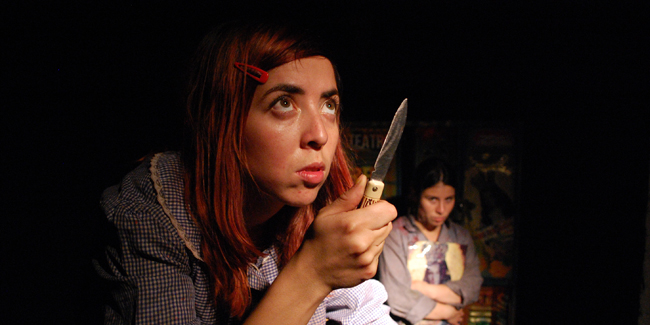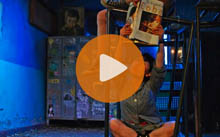LAS TRAJEDIAS SE LAS DEJAMOS A SHAKESPEARELET’S LEAVE THE TRAJEDIES TO SHAKESPEARE
CHILE
Compañía Familia Repudio
Dirección Stefanis Duarte
Dramaturgia Stefanis Duarte y Dominique Aravena
Ana y Clara, dos adolescentes privadas de libertad, reflexionan acerca de su realidad y adoctrinamiento, cuestionando sus vidas. Desde esta frustración nace la idea de transformar su destino, renunciar a la herencia social y genética, y reescribir sus historias.
*En el título «trajedias» está escrito con «j» por decisión creativa de la compañía.
RESEÑAEn esta ópera prima, los creadores instalan al público como espectadores de espacios y situaciones reales, apelando a la verosimilitud como opinión artística y discurso político del colectivo. A través de la ironía y una constante inquietud, la historia se construye a través de la destrucción de las formas narrativas y lenguajes teatrales. De esta forma el sujeto creador genera un dialogo constante entre la representación y el público.
El dispositivo escenográfico, la actuación, video y música, adquieren relevancia en la puesta en escena al crear una narración paralela al texto dramático. Esta mezcla de lenguajes genera un resultado lleno de emociones inquietantes que nos pasean por momentos que bordean lo real y lo ficticio.
El tema principal de la obra se centra en la decisión y consecuencias que desembocan en una opción final. Desde aquí, Ana y Clara, adolescentes privadas de libertad, reflexionan acerca de su realidad y adoctrinamiento, cuestionando sus vidas. Desde esta frustración nace la idea de transformar su destino, renunciar a la herencia social y genética y reescribir sus historias. Esta decisión se enfrenta a los miedos y la represión que ejercen las ortopedias sociales sobre ellas, la clásica auto-compadecencia del ser transformada en valentía y decisión. La obra finaliza con un mensaje abierto que da la oportunidad al espectador de hacerlo comparecer y confrontarlo con sus horrores: un espacio para la conciencia.
Stefanis Duarte, actriz y directora egresa de la carrera de artes escénicas de la Universidad de Playa Ancha, Valparaíso, con el montaje La negra Ester. Realiza estudios posteriores en el centro de investigación Teatro La Memoria. En 2009 presenta Antígona de Brecht, dirigida por Rodrigo Pérez y La gaviota de Chejov, dirigida por Alfredo Castro. Ese mismo año ingresa como actriz a la compañía Teatro Mendicantes con el montaje El gran baile gran, En tránsito y los pasacalles De la chimba al puerto y Plaza de armas. Su trabajo como directora comienza con Las trajedias se las dejamos a Shakespeare (2011). Actualmente realiza estudios de cine en la escuela de cine popular FECISO, donde lleva a cabo un proyecto de video-documental basado en el trabajo de Familia Repudio.
Familia Repudio nace el año 2010 en el puerto de Valparaíso desde la necesidad de crear y generar un arte político capaz de entrelazar distintas disciplinas del arte. Desde esta posición, la puesta en escena busca una desjerarquización escénica, refiriéndose a la pluralidad de oficios que se conjugan dentro del colectivo: música, teatro, video, gráfica, plástica y grafiti, se unen en pro de un texto dramático. Este trabajo que nace desde la inspiración de instalar y acercar al espectador hacia un dispositivo escénico alejado de teatralidad, crea un acercamiento con la realidad, desde un contexto en donde la crítica, la plástica y la estética se unen en un mensaje que busca hacer confrontar al público con sus horrores, bellezas y miedos. Desde esta opción, el colectivo contextualiza e instala sus temáticas en los “no lugares”, es decir, lugares fantasmas típicos de la geografía popular, espacios segregados y olvidados a veces por el arte y la sociedad.
Esta tragedia con J, es un texto que abarca temáticas universales, conflictos adolescentes ocupados como anécdota para hablar de un padecer universal. Desde el año 2010, comienza este viaje creativo dirigido por Stefani Duarte, quien busca trabajar desde la dificultad de asumirse como sujeto creador activo capaz de opinar, hacer y ocupar la precariedad para volcarla hacia un trabajo artístico que se sustente dese la autogestión y el compromiso teatral. Es así como su búsqueda concluye en extirpar el fenómeno personaje y mejor hablar de persona.
El colectivo trabaja desde la didáctica del diálogo, generando una instancia de conversación con el espectador a través de un conversatorio que se realiza después de cada función, es aquí donde el espectador tiene la posibilidad de expresar las diferentes sensaciones, emociones y opiniones provocadas por el montaje. Así, creen, nace el verdadero dialogo y enfrentamiento entre actor-espectador. Actualmente la Familia se encuentra realizando un trabajo de laboratorio para la creación de su nuevo montaje, Juana tres kokos.
Compañía Familia Repudio
Dirección Stefanis Duarte
Dramaturgia Stefanis Duarte y Dominique Aravena
Elenco Stefanis Duarte y Dominique Aravena
Música Jana Siimes.
Diseño integral Familia Repudio
Construcción escenográfica e iluminación Eduardo P. Hinojosa.
Técnicos Lucia Valenzuela, Felipe San Martin y Ximena Cañas.
Tramoya Gonzalo Olivares
Gráfica Gonzalo Olivares
Realización audiovisual Felipe Bello y Familia Repudio
Estreno 24 de noviembre de 2011, Liceo Eduardo de la Barra
Duración 1 hora
Photo: Lorenzo Mella
CHILE
Company Familia Repudio
Directed by Stefanis Duarte
Written by Stefanis Duarte and Dominique Aravena
Ana and Clara, two teenagers deprived of their freedom, reflect on their situation and their indoctrination, questioning their lives. Their frustration gives rise to the idea of changing their destiny, renouncing their genetic and social heritage, and rewriting their own stories.
SYNOPSISIn this debut work, the creative team sets the public as spectators in real situations and spaces, calling on verisimilitude as the collective’s artistic opinion and political statement. Using irony and ceaseless questioning, the story is built through the destruction of narrative forms and theatrical idioms. The creative subject thus generates a constant dialog between the performance and the audience.
The set design, acting, video, and music become relevant in the production, creating a new narrative in parallel with the script. This mix of idioms generates a result filled with worrying emotions that take us on a journey through moments that lie on the borderline between reality and fiction.
The work’s main thread is based on the decision and consequences that stem from one final option. That causes Ana and Clara, teenagers deprived of their freedom, to reflect on their situation and their indoctrination, questioning their lives. Their frustration gives rise to the idea of changing their destiny, renouncing their genetic and social heritage, and rewriting their own stories. That decisions butts up against the fears and repressions that society’s straightjacket exerts upon them, the classic self-imposed need of a person transformed through courage and decisiveness. The work ends with an open message that gives the audience a chance to call in and confront their horrors; a space for consciousness.
Stefanis Duarte is a playwright and director, who studied the stage arts at the Universidad de Playa Ancha, Valparaíso, ending her training with a production of La negra Ester. She went on to continue studying new options at the Teatro La Memoria. In 2009 she presented Brecht’s Antigone, directed by Rodrigo Pérez, and The Seagull by Checkhov, directed by Alfredo Castro. In the same year she joined the Teatro Mendicantes company, appearing in El gran baile gran, En tránsito, and street theater works De la chimba al puerto and Plaza de armas. Las trajedias se las dejamos a Shakespeare is her directorial debut (2011). She is currently studying filmmaking at popular cinema school FECISO, where she is working on a documentary based on the works of Familia Repudio.
Familia Repudio was founded in 2010 in the port city of Valparaíso, as a response to a need to create and generate political art with a capacity to draw together different disciplines. From this position, the production seeks to strip away the hierarchies of the stage, calling on the wide range of roles that fit together in the collective: music, theater, video, graphics, art design, and graffiti, coming together to form a whole with the script. This work is born of inspiration to present the audience with a use of the stage that is set apart from the traditions of the theater, moving closer to reality, created in a context where criticism, fine art, and aesthetics meet in a message that seeks to make the audience confront its horrors, beauties, and fears. This decision causes the collective to contextualize and implant its creations in ‘non-spaces’ – the ghost places of popular geography, spaces set apart and forgotten at times by art and society.
This tragedy with J is a text that takes in universal issues, using adolescent conflicts as an anecdote to talk about something of universal relevance. The creative journey helmed by Stefani Duarte started in 2010, with a goal of working from a context of the difficulty of being an active creative subject, able to state opinions, to make and occupy precariousness in order to twist it into an artistic work that is based on self-management and dedication to the theater. This search has reached an end, extirpating the persona phenomenon and rather dealing with the person.
The group bases its work on the didactics of dialog, building a conversation with the audience through a discussion session held after each performance, where attendees have the chance to express the different feelings, emotions, and opinions that the work has given them. This, they believe, creates a true dialog and meeting point between the actor and the spectator. The Familia is currently working on a laboratory initiative to sow the seeds for its next work, Juana tres kokos.
Company Familia Repudio
Direction Stefanis Duarte
Dramaturgy Stefanis Duarte and Dominique Aravena
Cast Stefanis Duarte and Dominique Aravena
Music Jana Siimes.
Integral design Familia Repudio
Scenography construction and lightning Eduardo P. Hinojosa.
Technicians Lucia Valenzuela, Felipe San Martin and Ximena Cañas.
Stage machinery Gonzalo Olivares
Graphic Gonzalo Olivares
Audiovisual realization Felipe Bello and Familia Repudio
Premiere November 24th 2011, Liceo Eduardo de la Barra
Length 1 hour

